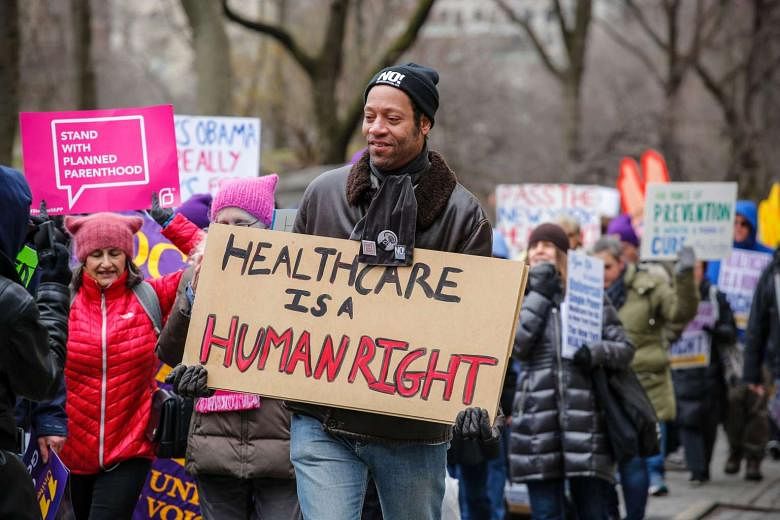With the American Health Care Act headed to the Senate - and possibly President Donald Trump's desk - it's important to step back from the debate over the Bill's details and recognise two essential truths about American healthcare.
First, healthcare costs much more in the United States than in other developed countries and, on average, the outcomes are worse. Second, any plan that focuses mainly on reducing the cost of insurance will inevitably lead to less access to care. Indeed, whatever Republicans say about high-risk pools and other ways that their plan covers vulnerable people, the fact is that millions will lose coverage.
Healthcare in the US is more expensive because, unlike systems in other countries, ours rests on the idea that profits and quality healthcare go hand in hand. As a result, government programmes working with our existing structure of for-profit insurance companies can expand and improve coverage (like the Affordable Care Act, or ACA) or offer lower insurance premiums (like the new Republican plan). But they can't do both.
Supporters of the ACA, also known as Obamacare, talked a good game about "bending the cost curve", but that was never a primary concern. The goal, largely achieved, was to expand access and to mandate coverage for essential health benefits and pre-existing conditions.
In contrast, the thrust of the Republicans' Bill is to lower the cost of health insurance by removing the guarantees of the ACA. States would be able to exempt any of the essential health benefits from insurance mandates, and they would also be allowed to exclude patients with pre-existing conditions. Millions are likely to lose their health insurance, but the young and generally healthy would pay much lower premiums.
In short, the two plans are not different takes on the same problem. They are different takes on different problems.
And the two problems are not equal concerns. Yes, the price of insurance is an issue - although a properly designed plan would at least move most of those costs off individuals and small businesses and onto the government's shoulders.
Access to quality care, in contrast, is literally a matter of life and death (and, of course, costs for those who are no longer covered). And not just for the newly uninsured. One principle underlying the Republican plan is that patients, as consumers, should pay only for what they need: The sick need more coverage and so pay more (possibly with a small amount of federal subsidies), and vice versa for the healthy.
Here's the flaw in the logic: Broadly speaking, "sick" and "healthy" are not fixed qualities. The whole idea behind insurance is that anyone healthy can get sick, and so everyone should have the same coverage. When the H1N1 flu virus struck a few years ago, many of the sickest patients were otherwise reasonably healthy adults, who survived only because of intensive care, which often cost well over US$5,000 (S$7,020) a day.
However, I think we would all agree that such care is worth what it costs, since essentially healthy people went to the hospital dangerously ill and left restored. The ACA mandates such coverage, even though it means everyone's insurance will be more expensive. The cheaper, non-comprehensive insurance policies allowed under the new Republican healthcare Bill might not cover such situations.
There's one other problem with the Republican plan. It promises to reduce the price of insurance, and it might do that for some people. But it won't make much of a dent in the overall price of healthcare because it doesn't deal with the fundamental reasons that healthcare is so expensive - the profit-driven nature of the system.
For better or (mostly) worse, the American healthcare industry is a largely for-profit sector. Healthcare is expensive because companies have to charge more to maintain revenue. That doesn't mean everyone in the industry is greedy although, as physician turned journalist Elisabeth Rosenthal documents in her new book, An American Sickness, it's hard not to see greed in billing practices designed to maximise profit. Healthcare profiteering also depends on exorbitant prices for medical equipment and deceptive marketing for expensive brand-name drugs.
In any case, these profit-focused aspects of healthcare do nothing to improve care and arguably make it worse because they focus time and resources on revenue generation rather than on patients.
In this context, the new Republican healthcare plan is a ruse: Less pricey health insurance that does not actually make healthcare less expensive, while eliminating Obamacare protections, is likely to cause millions of Americans to lose their health insurance altogether.
Every other industrialised country offers healthcare that is cheaper and better because they use government controls to balance revenue generation and the costs of meeting patients' needs.
If Republicans really want cheaper insurance policies to equal quality care, then they need to guarantee coverage and make that affordable by reining in healthcare profits. Because getting cheaper insurance at the expense of endangering one's life is not a healthcare bargain.
NYTIMES
- Theresa Brown, a hospice nurse, is the author of The Shift: One Nurse, Twelve Hours, Four Patients' Lives.

